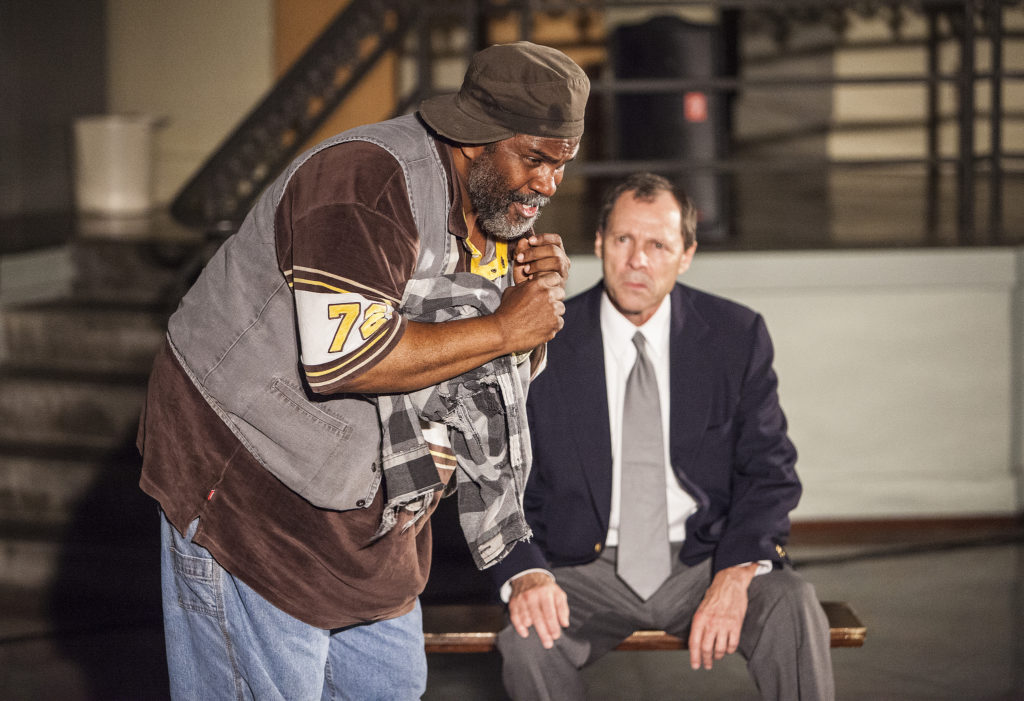
Most of the world ignored Johnny Ellis when he lived on the streets of Nashville, homeless and using crack. But four years after his death, a play about one of Ellis’ friendships is going on the road, hoping to help audiences around the U.S. see the human face of homelessness.
Stand is a portrait of a damaged man: born to a heroin-addicted mother, severely burned as a young boy, raised in foster care, and then on the streets for his entire adulthood. But actor Chip Arnold also points out it’s a buddy story about two men who genuinely like each other.
“People get the humor of it because of the truthfulness of the relationship,” Arnold says about moments when the pair tease each other, laugh at each other and, yes, frustrate each other.
Playwright Jim Reyland says that’s how it really was in his decade of friendship with a man he describes as “infinitely charming and broken, all at the same time.”
The two met outside the Cathedral of the Incarnation on West End Avenue, where Ellis would beg. For three years, they exchanged pleasantries: “Hello, how are you doing?” Time after time, it didn’t really go further than that. Then came the rainy day when Reyland noticed Ellis sitting outside with a half-broken umbrella.
“I said, ‘Johnny, come on, let’s get you out of that rain, let’s do something. I’ll help you.’ And so from then on until he died that’s what we did,” Reyland says.
Reyland helped Ellis find caseworkers and places to live. He took him for dental work and MRIs. At one point, Reyland says his friend asked for Christmas cards; he wanted to send them to long-lost family members.
Ellis died soon after that, hit by a car as he jaywalked across Murfreesboro Road.
Shining A Light
Reyland honored his friend the best way he knew how, by writing a play. The next year, he mounted the first production of
Stand, with Chip Arnold playing a version of Reyland and Barry Scott in the role of Ellis.
Scott admits it isn’t easy or comfortable to act the part of a man ravaged by decades of hard living. He speaks in a higher, more strident pitch than his natural voice. He slumps his body into a caved-in and weary position. He shuffles across the stage. Scott says the discomfort is worth it if it helps shine a light on people who are all too often ignored.
“Homeless people are like invisible people,” Scott says. “The play suddenly makes you see them. You see them everywhere after you see the play. You think differently about yourself, and you think differently about them.”
Arnold and Scott performed the show 40 times in 2012. When Reyland came back to them with word that HCA had agreed to pay for a tour of five other cities, both men quickly signed on to reprise their roles out of a sense of mission.
After performances this weekend at TPAC, the show will play in St. Louis, Kansas City, Las Vegas, San Jose and Los Angeles. In each place, proceeds from ticket sales are earmarked for homeless outreach agencies.
Of course, the play shows that some of the people who most need those agencies are like Ellis, unlikely to take advantage without the gentle push from a friend. And sometimes not even then.
In one of the play’s last scenes, Arnold’s character offers Ellis a ride to the motel where he has a room.
“No I don’t want to, I want to sleep outside like I used to behind the little tin shack where they keep the meat. You suppose what’s more important? Me or the meat?”
At the very least, Reyland hopes audiences will be more likely to see the importance of men like Ellis, and how much there is to be gained from stopping, talking, and getting to know them.


